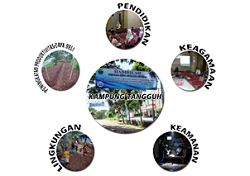Pembangunan Kampung Tangguh Berbasis ke-RT-an di Desa Sukasari Kabupaten Cianjur Building Resilient Community Based on Neighbourhood Program in the Village of Sukasari, Cianjur District
Main Article Content
Abstract
A resilient village is an integral part of Indonesia's national resilience concept and paradigm. Theoretically, resilient towns have a root in the idea of human security, particularly community security. The resilient town can be measured by readiness, social trust, leadership, collective efficacy, and place attachment. This program is carried out in RT 03 RW 13 Desa Sukasari Kec. Cilaku Kab. Cianjur. The program is planned within three implementation phases, three years. Because it is oriented towards social engineering, the methods used are lectures, FGD, control and monitoring, and gap analysis. Five priority programs in 2020-2021 have been determined in the initial phase, namely: education, religion, security and health, economic productivity, and environment. Meanwhile, the stakeholders of each program are RT management, DKM and asatidz, foundations and teachers, and cooperatives. These programs are integrated, both between programs and among stakeholders, with a community networking system. As a result, most targeted programs can be implemented well by the second half of their first year. Such as Madrasah Diniya, Al-Badar Foundation, majlis taklim, urban farming, development of public facilities, etc. The main challenge for this program is to maintain consistency in the performance of stakeholders to keep the program sustainable
Downloads
Article Details
Authors who publish with this journal agree to the following terms:
- Any article on the copyright is retained by the author(s).
- Author grant the journal, right of first publication with the work simultaneously licensed under a Creative Commons Attribution License that allows others to share work with acknowledgment of the work authors and initial publications in this journal.
- Authors are able to enter into a separate, additional contractual arrangements for non-exclusive distribution of published articles of work (eg, post-institutional repository) or publish it in a book, with acknowledgment of its initial publication in this journal.
- Authors are permitted and encouraged to post their work online (e.g., in institutional repositories or on their websites) prior to and during the submission process, as can lead to productive exchanges, as well as earlier and greater citation of published work.
- The article and any associated published material is distributed under the Creative Commons Attribution-ShareAlike 4.0 International License
References
Herman. 2019. Tingkat Partisipasi Masyarakat Dalam Perencanaan Pembangunan Desa Ulidang Kecamatan Tammerodo Kabupaten Majene. Growth : Jurnal Ilmiah Ekonomi Pembangunan. 1(1):75-98.
Jacob, T. 1999. Disentegrasi Moral Masyarakat Dalam Prespektif Ketahanan Nasional. Jurnal Ketahanan Nasional. 4(3):1-8. https://doi.org/10.22146/jkn.11950
Kusumaningrum, U.A., Wahyuni, B.D., Nasrudin. 2022. Revitalisasi Kampung Tangguh COVID-19 Sebagai Upaya Penguatan Resiliensi Keluarga. Sasambo: Jurnal Abdimas. 4(1):110-117. https://doi.org/10.36312/sasambo.v4i1.593
Lerch, D. 2017. The Community Resilience Reader: Essential Resources for an Era of Upheaval. Washington (US): Island Press.
Leykin, D., Lahad, M., Cohen, O., Goldberg, A., Aharonson-Daniel, L. 2013. Conjoint community Resiliency assessment measure-28/10 items (CCRAM28 and CCRAM10): a self-report tool for assessing community resilience, American Journal of Community Psychology. 52(3–4):313–323. https://doi.org/10.1007/s10464-013-9596-0
Maulani, ZA. 1998. Agama dan Ketahanan Nasional Hubungan Islam dengan ABRI Sebagai Fundamental Politik. Jurnal Ketahanan Nasional. 3(2):1-10. https://doi.org/10.22146/jkn.11673
Megasari, R., Vidyastuti, A., Rahayu, E., Alfiru, O., Perdana, M. 2020. Upaya Memutus Penyebaran Virus Covid-19 Melalui Pembentukan Kampung Tangguh Semeru Di Desa Tegalsari Kabupaten Malang. Jurnal Graha Pengabdian. 2(3):212-222.
Muladi. 2007. Konsep "Comphrehensive Security" Dan Ketahanan Nasional. Jurnal Ketahanan Nasional. 12(3):1-9. https://doi.org/10.22146/jkn.22124
Purwanegara, D. 2004. Genesis Ide Ketahanan Nasional (TANNAS) Indonesia. Jurnal Ketahanan Nasional. 9(2):1-26. https://doi.org/10.22146/jkn.22148
Raharjo, B. 2021. Fintech Teknologi Finansial Perbankan Digital. Semarang: Yayasan Prima Agus Teknik.
Rapaport, C., Hornik-Lurle, T., Cohen, O., Lahad, M., Leykin, D., Aharonson-Daniel, L. 2018. The relationship between community type and community resilience. International Journal of Disaster Risk Reduction. 31:470–477. https://doi.org/10.1016/j.ijdrr.2018.05.020
Sampurna, R.H. 2020. Meningkatkan kualitas hidup sehat masyarakat Dayak melalui lokakarya Sekolah Sehat di Kabupaten Landak Kalimantan Barat. Riau Journal of Empowerment. 3(2):117-126. https://doi.org/10.31258/raje.3.2.117-126
Setyawan, D.P., Sumari, A.D.W. 2016. Diplomasi Pertahanan Indonesia dalam Pencapaian Cybersecurity Melalui ASEAN Regional Forum on Cybersecurity Initiatives. Jurnal Penelitian Politik. 13(1):1-20. https://doi.org/10.14203/jpp.v13i1.250
Sudiar, S. 2019. Pendekatan Keamanan Manusia dalam Studi Perbatasan Negara. Jurnal Hubungan Internasional. 7(2):152-160. https://doi.org/10.18196/hi.72139
Suryohadiprojo, S. 1997. Ketahanan Nasional Indonesia. Jurnal Ketahanan Nasional. 2(1):13-31. https://doi.org/10.22146/jkn.19163
Sutomo, A.H. 2011. Kesehatan Masyarakat Indonesia Berbasis Ketahanan Nasional. Jurnal Ketahanan Nasional. 16(2):1-8. https://doi.org/10.22146/jkn.22354
Susetyo, H. 2008. Menuju Paradigma Keamanan Komprehensif Berperspektif Keamanan Manusia Dalam Kebijakan Keamanan Nasional Indonesia. Lex Jurnalica. 6(1):1-10.
